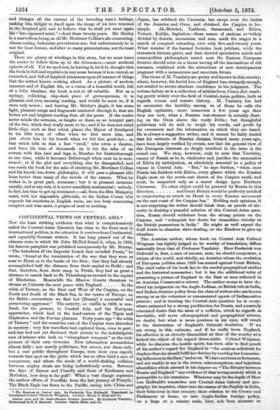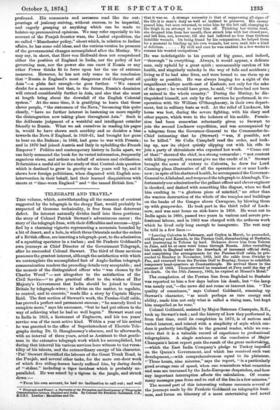CONTINENTAL VIEWS ON CENTRAL ASIA:*
War the least striking evidence that what is comprehensively called the Central,Asian Question has risen to the front rank in international politics, is the attention it receives from Continental, and especially German writers. It has long passed out of the obscure state in which Sir- John McNeil found it, when, in 1836, his famous pamphlet was published anonymouslyby Mr. Murray. 't The battalions of the Imperial Guard that invaded Persia," he wrote, "found at the termination of the war that they were as near-to Herat as to the banks of the Don ; that they had already accomplished half the distance from their capital to Delhi ; and that, therefore, from their camp in Persia, they had as great a distance to march back to St. Petersburg as onward to the capital of Hindostan. Meanwhile the Moscow Gazette threatens to dictate at Calcutta the next peace with England In the -wilds of Tartary, on the East and West of the Caspian, on the North and South of the Black Sea, in the centre of Europe, on the Baltic—everywhere we find her [Russia] a successful and persevering aggressor." The activity, eo visible in 1836, is con- lined, for the present, to Central Asia, and the European approaches which lead to the head-waters of the Tigris and Euphrates, and the Persian plateaus. Forty years ago "the wilds of Tartary" and the countries east of the Caspian were shrouded in mystery ; very few travellers had explored them, even in part ; and.war had not yet disclosed their secrets to the indefatigable men of science who look on "triumphant conquest" as the rude pioneer of their own victories. Now information accumulates almost daily ; not merely politicians, but miens, nor these only, but a vast public throughout Europe, turn their eyes eagerly towards that spot on the globe which has so often bred a race of conquerors, and where the seeds of a world-shaking collision between mighty rivals are being industriously sown. Between the days of Barnes and Conolly and those of Kaufmann and McGahan, how deep is the gulf ! What a vast change separates the earliest efforts of Peroffski from the last journey of Forsyth ! The Black Eagle has flown to the Pacific, eating into China and • The Russians in Central Asia. By Frederick Von Hellwald. Translated by Lieutenant-Colonel Theodore Wirgman. London: Henry S. King and Co.
Central Asia and the Anglo-Russian Frontier Question. By Arminitie Vambdry. Translated by E. F. Bennett. London: Smith, Elder, and Co.
Japan, has subdued the Caucasus, has swept over the basins of the Jaxartes and Oxus, and obtained the Caspian in fee- simple. Ak-Metchet, Tashkent, Samarcand, and Khiva, Verne, Kuldja, Saghalien—these names of stations so 'widely divided by deserts, mountains, and seas, mark the stages in a march of conquest extending over only five-and-twenty years. What wonder if the learned. Societies look jubilant, while the statesmen become grave, and that shrewd speculative minds and cosmopolitan philosophers seated near the Eastern European frontier should seize on a theme having all the fascinations of old romance, combined with the attractions of new developments pregnant with a momentous and uncertain future.
The views of M. Vambery are pretty well known in this country, where, however, his fervid love of England has, strangely-enough, not availed to secure absolute confidence in his judgment. The volume before us is a collection of articles from Unsere Zeit, reach- ing pretty widely over the field of Central-Asian politics, both as regards recent and remote history. M. Vambery has had to encounter the hostility among us of those he calls the English optimists, more numerous a few years ago than they are now, when a Russian war-steamer is actually float- ing on the Oxus above the reedy Delta.; but thoughtful politicians will do well to weigh his words, and profit by his comments and the information on which they are based. He is always a suggestive writer, and it cannot be fairly denied that his estimate of Russian designs, formed many years ago, have been largely verified by events, nor that his general view of the European interests so deeply involved in the issue is the sound one. We stop, however, only to note that Vambery, enemy of Russia as he is, vindicates and justifies the annexation of Khiva by anticipation, as absolutely essential to a policy of repose in Central Asia. "But," he says• further, "when once Russia has finished.with Kliiva, every glance which the Russian Eagle casts on the south-east shores of the Caspian could, and must, be suspected only as a secret design upon Northern Chorassan. No other object could be pursued by Russia in this
direction, and Great Britain would be perfectly justified in conjecturing an attack on Herat in every Russian movement on the east coast of the Caspian Sea." Holding such opinions, it is not surprising the writer should think that, as proofs of sin- - cerity in desiring a peaceful solution of this Central-Asian ques- tion, Russia should withdraw from the strong points on the Caspian, and "relinquish her desire for immediate vicinity to the British possessions in India." He might as well expect the Gulf Arabs to abandon slave-dealing, or the Hindoos to give up ritualism.
The Austrian author, whose book on Central Asia Colonel Wirgman has rightly judged to be worthy of translation, differs materially from that of Professor Vambery. Herr Frederick von Hellwald is, first, a man of science, next, we should conjecture, a citizen of the world, and thirdly, an Austrian whom the evolution of European politics since 1859 has soured against Great Britain. The chief value of his book lies in the careful geographical studies and the historical summaries ; but it has the additional value of presenting a picture of England in the East as seen reflected in an Austrian Conservative mirror. The author seems to have de- rived his judgments on the Anglo-Indians, on British rule in India, and •Indian-frontier policy from the class of writers who are known among-us as the volunteer or remunerated agents of Indian native princes ; and in treating the Central-Asia question he is every- where animated by a strong predilection for Russia, and a scarcely concealed desire that the issue of a collision, which he regards as inevitable, will serve ethnographical and geographical science, no doubt, but what is more precious in his eyes, will result in the destruction of England's Oriental dominion. If we are wrong in this estimate, and if he really loves England, his affection is as cleverly dissembled as that of the worthy wl- o kicked the object of his regard down-stairs. Colonel Wirgman, while he discerns the hostile spirit, has been able to find proofs of his author's regard for England in "the anxious solicitude he displays that she should fulfil her destiny by exerting her humanise- ing influences in the East," and so on. We have not been so fortunate, and are unable to see in the errors, misconceptions, and injurious absurdities which abound in his chapter on "The Rivalry between Russia and England " any evidence of that loving anxiety which is perceptible to his- translator. Whatever may be the depth of Herr von Hellwald's researches into Central-Asian history and geo- graphy, his inquiries, either into the status of the English in India, their behaviour in that country, their relation to the Crown and Parliament at home, or into Anglo-Indian foreign policy, on a large or a minute scale, have not been accurate or profound. His comments and sarcasms read like the out- pourings of jealousy striving, without success, to be impartial, and eagerly grasping at anything which can be made to bolster-up preconceived opinions. We may refer especially to his account of the Punjab frontier wars, the Lushai expedition, the so- called "Manchester policy," about which, in relation to Indian affairs, he has some odd ideas, and the curious version he presents of the governmental changes accomplished after the Mutiny. We may say, in short, that Herr von Hellwald does not comprehend either the position of England. in India, nor the policy of her governing men, nor the power she can exert if Russia or any other Power thinks fit to force upon her the use of extreme measures. However, he has not only come to the conclusion that "Russia is England's most dangerous rival throughout all Asia "—a plain fact enough—he goes further. " We cannot doubt for a moment but that, in the future, Russia's dominion will extend considerably further in Asia, and also that she must at length bring about the downfall of the English Colonial system." At the same time, it is gratifying to learn that those clever people, "the statesmen of the Neva," foreseeing this quite clearly, " have no further interest in hastening on more rapidly the disintegration now taking place throughout Asia." Such is the deliberate judgment of a watchful and intelligent outsider friendly to Russia. What we ask ourselves in reading his pages is, would he have shown such acerbity and so decisive a bias towards the Neva if England, in 1859-61, had brought her guns to bear on the Italians ; in 1866, had gone to war with Prussia; and in 1870 had joined Austria and Italy in upholding the French Emperor ? Politics and contemporary history in India apart, we can fairly commend the book for its varied information, frequently sagacious views, and ardour on behalf of science and civilisation. It furnishes a useful aid to the study of that Central-Asia question which is destined to grow in gravity as the years roll by, and it shows how foreign politicians, when disgusted with English non- intervention in their behalf, lard their learned disquisitions with sneers at " time-worn England " and " the tamed British lion."



































 Previous page
Previous page